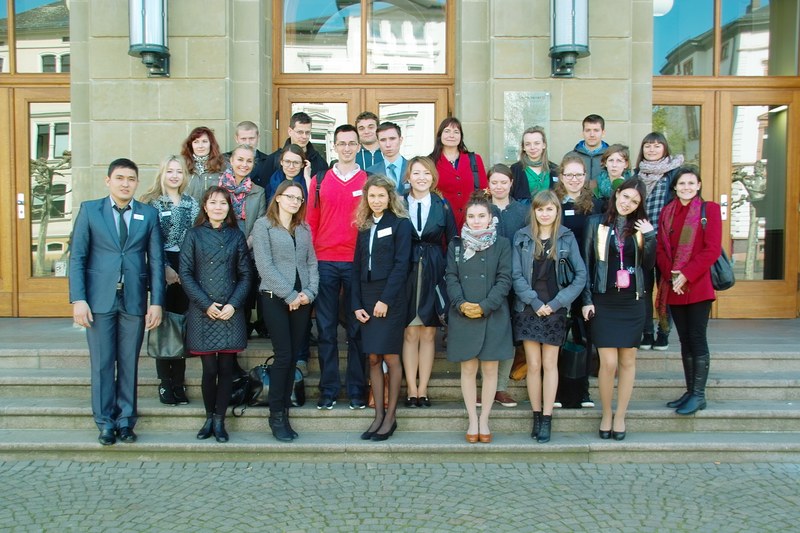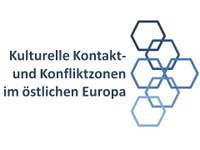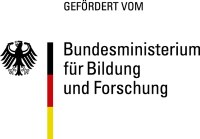Student Conference
Student Conference of the Thematic DAAD Network "Zones of Cultural Contact and Conflict in Eastern Europe"

The Student Conference of the Thematic DAAD Network was held from April 14th until April 16th 2014.
The target group of the event were advanced master students of linguistics, literature, history, political, social and cultural studies at JLU Giessen and partner universities in Łódź, Cluj-Napoca, Minsk, Kazan and Almaty. The didactically and medially prepared presentations of MA students related to the focal area of the Thematic DAAD Network were moderated by the academic teachers associated to the network and subsequently discussed in the multidisciplinary environment.
A selection of qualitatively excellent presentations will be published in an anthology.
Working languages of the Students Conference were German and English. Venue was the Margarete-Bieber-Saal, Ludwigstraße 34 in Giessen.
The conference was entitled "Cultural contact and conflict zones in Eastern Europe".
Under contact and conflict regions are understood imperial and (national)linguistic boundary, transition and contact zones, as well as urban spaces, which are characterized by linguistic, ethnic, religious or other culturally pooled contact and conflict scenarios.
There are also those conflict and contact zones taken into account, which no longer have the once existing cultural pluralism today, where those in the memory and identity politics or the historical-literary reflection still plays an essential role.
The scale of contact and conflict zones is ranging from low-conflict coexistence (as between Russians and Tatars in Kazan or between Belarusians and Russians in Minsk) over politics of memory and identity of conflictual rivalries (as in the 1990s, in Cluj-Napoca) to the violent escalation of cultural conflict patterns (such as 1939 to 1945 in ?ód? and from 1991 to 1995 in Croatia). Underlying is a geographically broad definition of Eastern Europe, in addition to East Central, Southeast and Eastern Europe are the interaction zones with Turkic-speaking cultures in Post-Soviet States included.
Thematic fields of the presentations
1)Imperialism and nationalism
2) Multilingualism and language contacts
3) Regionalism and regional studies
4) Urban History and urbanisation
5) Translation and cultural transfer
6) Text types and narrative studies
Presentations of participating students
|
Name and University of the speaker | Title of the presentation |
|---|---|
| Ekaterina Pankova (Giessen) | The role of Russian in the Soviet successor states |
| Almat Nurtazin (Almaty) | Problem of imperialism and nationalism |
| Dina Ildrovna Khairullina (Kazan') | Tatar tsarevich on the Russian throne |
| Liubou Kravets (Minsk) | Human Trafficking in Post-Soviet States: Reasons, Peculiarities, Solutions |
| Elena Chesnokova (Kazan') | Kazan in the early post-Soviet period. Space of the city (Based on the articles of the “Vechernyaya Kazan” (“Evening Kazan”) newspaper) |
| Aleh Kazak (Minsk) | Kulturelle und gesellschaftspolitische Entwicklung der Karpatenukraine (Podkarpatskaja Rus) als Teil der Tschechoslowakei bei der Beleuchtung der lokalen Publizistik in der ungarischen Periode (1939–1944) |
| Ekaterina Ippolitova (Giessen) | Das Gebiet Kaliningrad: eine Brücke zwischen Osten und Westen oder eine Konfliktzone? |
| Ainur Almenova (Almaty) | Central Asia in a Focus of the Superpower’s Interests |
| Valeriya Kazakova (Minsk) | Tourism as a factor of European integration of Belarus |
| Franziska Ramisch (Giessen) | Der Kulturkampf und die polnische Nationalbewegung |
| Azaliya Galieva (Kazan') | "Kazan words" in Russian regional lexicon: corpus approach |
| Mariya Leont'eva (Kazan') | Turkic borrowings in Russian lexicon: Problems of linguographic description |
| Alexandra Efimenko (Minsk) | Reshaping the face not reflected in the mirror. The case of Belarus |
| Monica Fetke (Cluj-Napoca) | Die Deutschen aus dem heutigen Rumänien: von dem Status des Einwanderers zum Rumäniendeutscher. Schwerpunkt: Siebenbürger Sachsen und Banater Schwaben |
| Alexandru Firus (Giessen) | Die Einwohner am Rande der Ortschaft. Geschichtliche und aktuelle Einblicke in die Wohnbedingungen der Roma in Rumänien |
| Maja Dębska (Łódź) | Stadtnarration und Identität am Beispiel des musikalischen Diskurses. Zeitgenössische Klassik in Łódź |
| Georg Scholz (Giessen) | Die Rolle der russischen Literatur bei der Entstehung der modernen tatarischen Literatur am Beispiel Ghabdulla Tuqaj´s |
| Mauye Adyrbekova (Almaty) | Creative activity of Cecelia Ahern in the World Literature |
| Kende Varga (Cluj-Napoca) | Rumäniendeutsche Literatur in den 1970-er Jahren mit Sicht auf die politisierende Lyrik der Aktionsgruppe Banat |
| Maria Janus (Łódź) | Figurentheater als Kulturkontaktzone. Theaterpraxis und Ausbildung |
| Nazira Iskakova (Almaty) | Analysis of “Text – Context – Media Text” interrelation |
| Alexander Eckermann (Giessen) | Die Metaphorisierung und die Mythologisierung des Großen Vaterländischen Krieges und der Kriegserfahrung im zeitgenössischen russischen Kino am Beispiel des Spielfilms "Stalingrad" |
| Ruslan Nuriev (Kazan') | Cultural contacts of Eastern European on the example of Azak in XIII-XV centuries |
| Oksana Simov (Giessen) | Trilogie 'Unsere Mütter, unsere Väter' als Beispiel für die Weigerung der Diskussion zwischen Deutschland, Polen und Russland |
Moderating academic teachers
Prof. Dr. Monika Wingender, Prof. Dr. Hans-Jürgen Bömelburg, Prof. Dr. Stefan Rohdewald, Daniel Müller M.A., Dr. Rayk Einax, Dr. Nazarii Gutsul, Aksana Braun Dipl.-Phil., Dr. Diana Hitzke, Katharina Bauer M.A., Prof. Dr. Thomas Daiber, Martina Lev M.A.
 |  |
|
|---|---|---|
 |
 |


